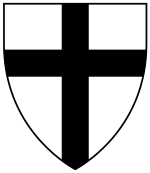


The Battle of Streva -1348
The Battle of Strėva, Strebe,
or Strawe was fought on 2 February 1348 between the Teutonic Order and the pagan Grand Duchy of Lithuania
on the banks of the Strėva River, a right tributary of the Neman
River, near present-day Žiežmariai. Chronicler Wigand of Marburg publicized this battle as a great victory
for the Knights: he claims that some 18,000 Lithuanians were killed or drowned while only 8 knights and 60 other soldiers
died on the Order's side. Narimantas and Manvydas, two sons of Gediminas, Grand Duke of Lithuania, are thought to be killed
in the battle.
Campaign and Battle
In 1347, the Teutonic Knights saw an influx of crusaders from France and England, where
a truce was made during the Hundred Years' War. Their expedition started in late January 1348, but due to bad weather, the
bulk of the forces did not proceed further than Insterburg. A small army led by Grand Commander and future Grand Master Winrich
von Kniprode invaded and pillaged central Lithuania (probably areas around Semeliškės, Aukštadvaris, Trakai)
for a week before being confronted by Lithuanian troops. The Lithuanian army included contingents from its eastern territories
(Volodymyr-Volynskyi, Vitebsk, Polotsk, Smolensk) which shows that the army was assembled beforehand, probably for a campaign
into the Teutonic territory. The Knights were in a difficult position: they could cross the frozen Strėva River only
a few men at a time and once most of their forces had crossed, the remaining soldiers would be annihilated. The knights had
limited supplies and could not wait. The Lithuanians, led by Kęstutis or Narimantas, also had short supplies and decided
to attack by hurling arrows and spears injuring a great number. However, at the critical moment the crusaders counter-attacked
with their heavy cavalry and the Lithuanians lost their formation. So many of them drowned in the river that Knights could
cross it with "dry feet." This episode caused much criticism of the source: the Strėva River is shallow,
especially during winter, and could not have caused such a massive drowning.
Aftermath
As a result of the defeat Lithuanians were weakened: the same year
the Knights attacked and pillaged Šiauliai area without much of opposition and destroyed a castle in Veliuona. In the
east, Lithuania lost influence in Pskov and Novgorod in 1348 and in Smolensk the following
year. The Knights attributed the victory to the Virgin Mary and in her honor Grand Master
Winrich von Kniprode established a Cistercian nunnery in Königsberg and a Franciscan
monastery in Wehlau. However, due to the change in leadership (the Grand Master Heinrich
Dusemer was troubled by poor health and died in 1353) and spreading Black Death, the Knights did not take full advantage
of one of the biggest defeats of the Grand Duchy.
